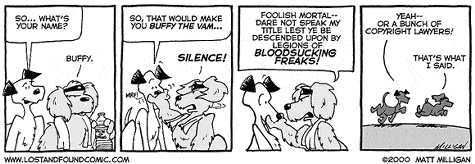
From Lost and Found, by Matt Milligan.
Edited 6 Sept 2005: I’ve been meaning to update this article for days, and I’ve been irresponsibly lax in not doing so. It has been pointed out by a reader that what the MPAA has done in Delhi is in violation of the Indian constitution, and will inevitably be overturned by their Supreme Court. This is a very good thing. That said, that the MPAA managed to convince a magistrate to authorize something that violates Indian law doesn’t make me feel much better about the situation.
The Motion Picture Association of America is concerned about piracy — specifically, about people pirating movies and distributing them on bootleg DVDs and over the internet. They’re so concerned that they have even set up a space on their website where they publish press releases about the war on digital piracy. These press releases are usually in Microsoft Word format, occasionally in PDF format, and proudly announce all the victories that Hollywood has achieved in its never-ending war against the people who illegally sell their product at a price much closer to what most of it is actually worth.
A PDF of a press release for July 26, 2005, for example, positively crowed about four lawsuits they filed in Waco, Texas against individuals who were illegally downloading and swapping movies online using peer to peer software. A Microsoft Word version of a press release for July 28, 2005 describes similar action taken against three individuals living in Rochester, New York.
Reading through these press releases, one wonders if the MPAA might be encountering a problem in regards to scale. Only four people? Only three people? Doesn’t it take an awful lot of time and effort to catch people in the act of piracy? Isn’t a three or four person lawsuit a rather unsatisfying return on your investment?
The MPAA apparently thinks so, because a press release issued on July 27, 2005 reveals a new, more efficient method of catching pirates: get a judge to give you the authority to search anywhere you want, in an entire city.
The city in question? Delhi, India, population 13,782,976.
That’s right: the city has homes and offices for 13,782,976 people, and the MPAA can tell the police to search every single one of them. Just in case.
I learned of this when it was posted on the blog Making Light, which in turn learned of it from BoingBoing and the Electronic Frontier Foundation. Basically, what the MPAA was granted in Delhi was a Writ of Assistance, a general-purpose search warrant that gives the writ holder access to, well, everything and everyone, at any time, on any pretense.
As the previous link notes, this is one of the things that contributed to a little piece of history known as the American Revoluion.
But that could never happen in the U.S., right?
The Fourth Amendment to the United States Constitution fairly explicitly forbids the use of writs of assistance. It does this when it states:
…and no warrants shall issue, but upon probable cause, supported by oath or affirmation, and particularly describing the place to be searched, and the persons or things to be seized.
That seems fairly straightforward. A Writ of Assistance doesn’t limit the persons or things to be siezed, doesn’t require you to describe the places you will search, doesn’t require oaths of any kind that put your reputation on the line and say “we need to search this place because…” it is instead the power to search with impunity, on any whim, without any accountability whatsoever. The Fourth Amendment demands accountability: the government must say why they want the warrant, describe what they are looking for, and specifically state where they will search.
So that’s that, right? Well, you’d think so, but we’re living in an age where sweeping legislation is passed to give the government more power in combating terrorism. All that’s required is that a prominent law enforcement agency make a connection between piracy and terrorism, and for that dire warning to be communicated to the people who make things happen.
This is admittedly a wild-eyed, worst-case scenario. There’s no reason to believe that the people who run the MPAA sit at home plotting how to overturn one of the cornerstones of American Jurisprudence in order to stop people from eating into their profits. And they didn’t stage a political coup in India in order to strong-arm a magistrate in Delhi to grant this authority, the convinced the magistrate that the issue was important enough to warrant such an extreme action.
But the fact that they went ahead and sought that power, and were so pleased with the outcome they were willing to issue a press release about it, suggests that they don’t see any moral issues at stake when it comes to exercising that power. If the opportunity to adopt the same tactics here in U.S. became available, would they demur?
It seems reasonable to me — yes, even responsible — to worry about the power that organizations can have, and the ways in which that power can be wielded, especially when it is on the scale as the search and siezure powers that have been granted in Delhi. Could that happen in New York, Chicago, or L.A.? Well, what’s stopping it?
Hint: it’s not the people who say “that’ll never happen.”


